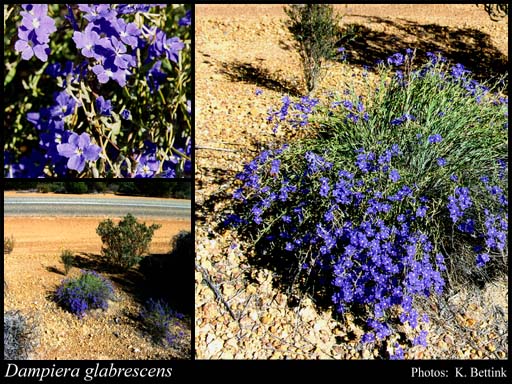- Reference
- Fl.Austral. 4:119 (1868)
- Conservation Code
- Priority One
- Naturalised Status
- Native to Western Australia
- Name Status
- Current
Erect perennial, herb, 0.2-0.5(-0.9) m high. Fl. purple-blue, Sep. White or grey/yellow sand. Gravel pits, roadsides.

Scientific Description
Stems ribbed. Leaves flat, 10-40 mm long, 2-12 mm wide, Indumentum absent (leaves glabrous); margins entire. Bracteoles present, 3-6.5 mm long, hairy, with simple hairs. Pedicel pedicellate, Pedicel length the pedicels 15-20 mm long, Indumentum present, Hair type with absent hairs. Calyx lobes present, Calyx length 2-4 mm long, hairy, with dense, simple hairs. Corolla blue, 6-7.5 mm long, auriculate, not spurred, hairy on the outside, with dense, dendritic hairs, glabrous on the inside; central lobes 4-5 mm long, with wings; outer lobes 5-6.5 mm long, wing present on both sides and clearly unequal, 0.8-1 mm wide on the narrower side, 1.8-2 mm wide on the broader side. Anthers connate. Ovary inferior, not gibbose; style 3.5-4 mm long, glabrous; indusium single, glabrous; ovules one or two. Flowers in September. Occurs in the Geraldton Sandplains (GS) and Avon Wheatbelt (AW) IBRA Region(s), of the South West (SW) Botanical Province. Conservation Code: Conservation code Priority One (P1).
Distribution
- IBRA Regions
- Avon Wheatbelt, Geraldton Sandplains.
- IBRA Subregions
- Katanning, Lesueur Sandplain, Merredin.
- Local Government Areas (LGAs)
- Dalwallinu, Dowerin, Wongan-Ballidu.